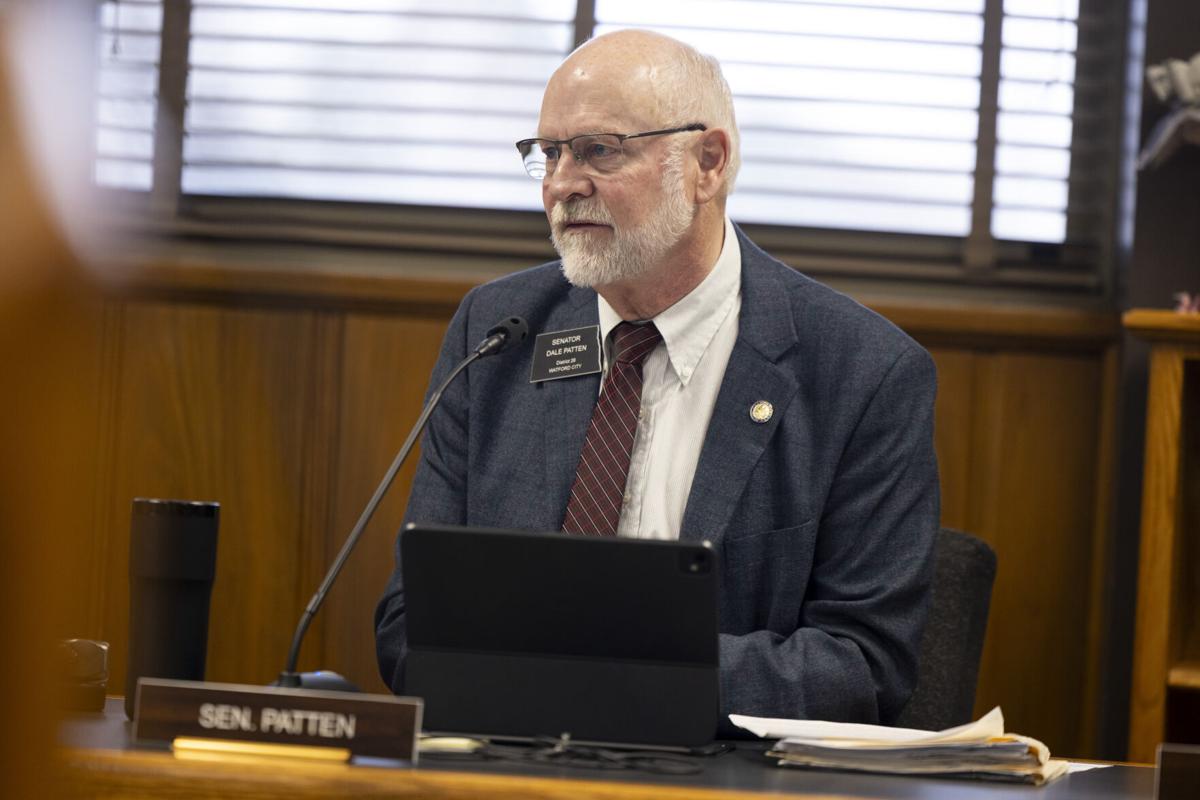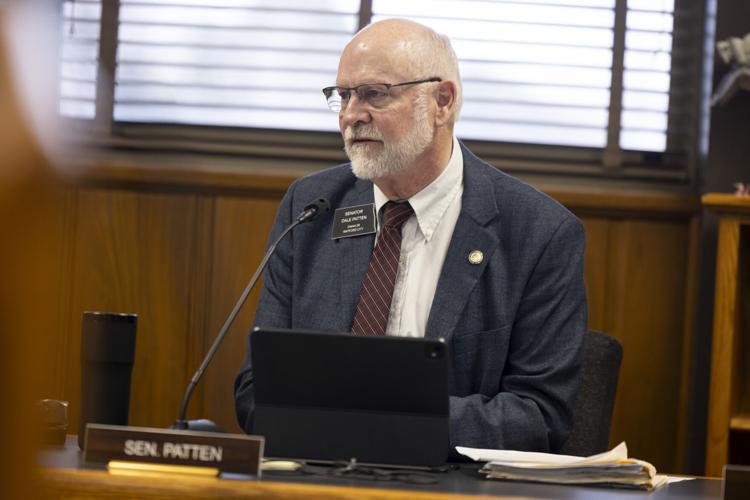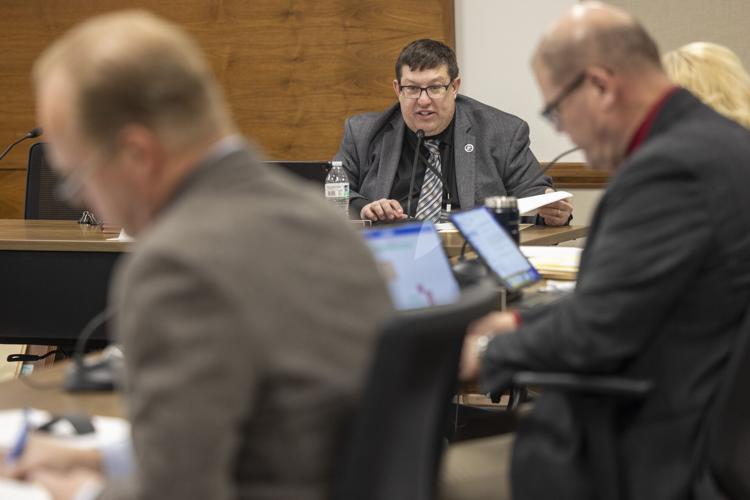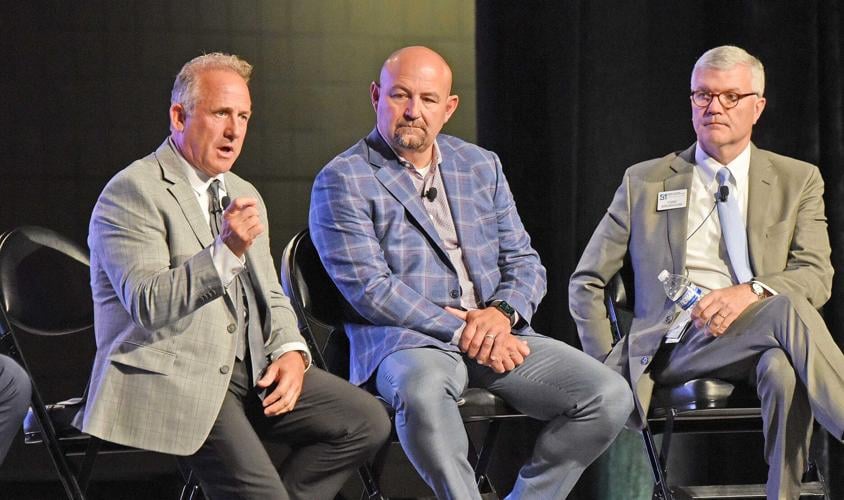Legislation to create a regulatory framework around critical mineral development could spur the industry's growth in North Dakota, but it is almost certain to be challenged in court. Meanwhile, lawmakers approved a huge expansion of a potential financial guarantee for a natural gas pipeline project despite much of the state Senate initially balking at the figure.
These two controversial measures were among the multiple bills that kept the lights turned on at the State Capitol until around 4 a.m. last Saturday morning, but they were not the only contentious debates around energy development during the recent legislative session.
In general, industry interests won out on changes to state law. Millions of dollars in research funding, tax breaks and other incentives for energy companies were also approved.
Lobbyists and sympathetic lawmakers said many of the state measures favoring energy companies were needed to maintain the vitality of industries that are a key part of the North Dakota's economy and tax base. But as the final days of the legislative session wore on, some lawmakers expressed frustration with the "now or never" framing of certain bills.
People are also reading…
- Mandan school officials find time capsule hidden in wall at old high school building
- Grocery stores in North Dakota impacted by cyberattack on distributor
- ‘Cult’ church member molested small boy while his children napped, new victim says
- North Dakota governor’s veto ‘clear and unambiguous,’ AG Drew Wrigley says

Sen. Brad Bekkedahl, R-Williston, listens to legislators during a conference committee hearing on Senate Bill 2014 at the North Dakota State Capitol on April 30.
"I'm just getting a little bit tired of all the time being faced with, 'We have to do this, at whatever expense, to whoever we can, because we have to do this. Because this is for economic development for the state of North Dakota, and we have to do this.' It just wears me out," Sen. Brad Bekkedahl, R-Williston, said last Friday night before voting against the regulatory framework for critical minerals.
Boosts for coal
The primary reason why House Bill 1459 -- the critical minerals legislation -- attracted so much controversy was because of how it is set to affect already existing coal mineral leases held by landowners -- a measure that one group argues is unconstitutional.
Years of study have shown that North Dakota's lignite coal reserves have high concentrations of rare earths and other critical minerals in them. Rare earths are a group of 17 elements that tend to travel together and are central to modern electronics; "critical minerals" is a political term used to describe minerals, including rare earths, that are seen as necessary for national and economic security.
There is only one active rare earths mine in the U.S., largely because China has had a stranglehold on the global market. But bipartisan efforts to bolster domestic production have emerged at the federal level in recent years. Supporters of HB 1459 said it could put North Dakota at the front of the line for where investment money goes.
The bill had largely been turned into a study after it encountered strident pushback from the Northwest Landowners Association (NWLA) during Senate Energy Committee hearings, but in the conference committee deliberations process between the two chambers, many of the original proposals returned.
Landowners with coal leases agreed to receive a financial return from companies for the coal, but in general, not specifically for rare earths that are commingled with the coal. HB 1459 specifies that the legal definition of coal includes critical minerals within it and sets a minimum 2.5% rate of return for mineral owners. The bill allows for separate negotiations on that rate, but the NWLA still sees the move as interfering with a private contract.
After the conference committee settled on a bill, the landowner group's attorney Derrick Braaten said there will be legal challenges.
Lawmakers who backed HB 1459 contended that a general legal understanding of a coal lease is that it already includes the other minerals within it. However, they said that the commingling language was needed to give companies the certainty to go ahead with a project.
The bill's supporters also acknowledged the likelihood of litigation and included an extensive public policy section that lays out the state's interest in developing the minerals which will be used to give more muscle to the likely defense of the law in court.
"There's a risk to doing nothing," said Sen. Jonathan Sickler, R-Grand Forks.
Another win for the coal industry came in the form of the extension of the coal plant tax break in House Bill 1279. The tax holiday began in 2021.
Over the last two decades, the coal industry has had financial struggles because of competition from natural gas and renewables, while simultaneously facing expensive requirements for pollution controls. When proposed, HB 1279 originally extended the 85% tax break for a decade. In the Senate, that got reduced to three years.
As lawmakers remained at an impasse on how to structure the tax break during conference committee hearings, three executives from companies operating four of the state's coal-fired power plants showed up to testify as to why the tax break should remain in place, largely blaming the low cost of wind energy and the federal tax credits in place that subsidize it.

Stacy Tschider, left, of Rainbow Energy Center, talks about carbon management during a panel discussion in October 2024 at the 50th annual meeting of the Lignite Energy Council at the Bismarck Events Center. Other panel members are Mac McLennan, center, with Minnkota Power Cooperative and Todd Brickhouse, right, with Basin Electric Power Cooperative, with Charlie Gorecki of the Energy and Environmental Research Group and Jason Bohrer of the Lignite Energy Center also in the group.
CEO of Basin Electric Power Cooperative Todd Brickhouse, CEO of Minnkota Power Cooperative Mac McLennan, and President Stacy Tschider of Rainbow Energy, an independent power producer that owns Coal Creek Station and sells power to utilities and industrial partners, all said even though federal policy is now more favorable for energy produced from coal, the industry still faces similar headwinds to 2021.
Despite their expensive operating costs -- and high carbon emissions -- utilities say that their coal plants are still needed to keep the grid functional and consumer rates lower by offering large sources of power to the Midwest grid, where new sources of energy have not replaced retired ones quickly enough.
Both Minnkota and Basin have put a significant amount of wind power onto the grid over the last two decades. Great River Energy -- Coal Creek's former owner -- has too.
Lawmakers settled on extending tax cuts for five years but decreasing the size of the break year-over-year.
Utilities net big wins
The continuance of the tax break for coal plants was not the only favorable outcome for power companies.
One new law greatly limits the ability for cities, counties and townships to use zoning to affect the placement of transmission lines within their jurisdictions.
Under House Bill 1258, a state siting permit for a transmission line would automatically supersede many local rules aiming to regulate the project. Though the law would apply to all power lines, the JETx line, a joint $440 million, 95-mile transmission project proposed for southeastern North Dakota was the subject of practically all public testimony in packed committee hearings.
JETx developers MDU and Otter Tail Power at the time said they had around 67% of the project footprint secured, but some local governments were using zoning to effectively block the project either through extensive setbacks or calls to bury the line. Opponents of HB1258, maintained that their zoning would allow the project, but it holds companies accountable for building it in accordance with local landowners' wishes.
Another bill enshrines reduced levels of liability for wildfires caused by transmission lines into state code.

Rep. Jason Dockter, R-Bismarck, speaks on Senate Bill 2339 at the North Dakota State Capitol on March 28.
Under Senate Bill 2339, utilities will not have "strict liability" for damages from wildfires, meaning they could not be held responsible without proof that they were negligent or intentionally caused a fire. That standard had been recognized by courts, but not by the Legislature, so it was subject to reversal by a judge until now. It also allows wildfire mitigation plans that meet certain criteria to be taken as evidence in court that a company "exercised a reasonable standard of care" to prevent a fire, granted that there is compliance.
A report from the Office of the North Dakota Fire Marshal attributed the cause of a wildfire that killed two men near Ray last fall to a downed power line; another report came back inconclusive, though a utility pole was unable to be ruled out.
Rep. Lawrence Klemin, R-Bismarck, said the bill will "allow the parties to really focus on whether the utility was negligent or not and not try to get into legal arguments about why strict liability should be changed."
But others viewed it as too much of a giveaway to power companies that already have mitigation plans.
"Somebody's got to pay," said Rep. Jorin Johnson, R-Fargo.
Lawmakers also moved against passing legislation that would have regulated the siting process for power-hungry data centers after vocal opposition from most state-based electric utilities, as well as data companies.
House Bill 1579 came after an electric utility cooperative in northwest North Dakota connected a large data center to the grid. The data center has since been blamed for increased grid strain and higher rates for customers of a separate utility -- the matter is in court right now. Under initial legislation, power users of 50 megawatts or more that wanted to connect to the grid would have had to go through a siting process at the Public Service Commission to prevent a similar scenario.
One member of the PSC pushed for and helped write the legislation, but another said that the northwest data center issue appeared to be a one-off, and more regulations would harm investment into the state.
Ultimately, the bill was converted into a study by the House Energy and Natural Resources Committee.
More money for gas pipeline, research and development
Power demands from data centers have also been cited by some officials as the driving force behind two huge natural gas pipeline proposals that would leave the Bakken oilfields in the west and travel east for industrial uses.
These are projects that the state has long sought out. Both oil and gas rise to the surface in the Bakken, but gas is seen as a byproduct and is wastefully flared if companies do not build the infrastructure to move it. A pipeline could help alleviate the issue and also create more markets for the oil industry, as falling geologic pressures are causing more gas to rise from the Bakken.
Pipeline companies need to find enough long-term customers for projects to make sense economically. In 2023, the Legislature set up a $30 million annual line of credit with the state-owned Bank of North Dakota that would allow the Industrial Commission to buy up space on a gas pipeline for 10 years with the goal of selling that space off to private companies for shorter periods of time. The state would be responsible for paying off whatever space it cannot sell.
The subsidy was expanded to $50 million a year -- or a potential $500 million total -- late during appropriations talks for Senate Bill 2014, the Industrial Commission's budget. Supporters said it was needed because proposed projects are larger than expected.
Senators initially rejected the expansion by a vote of 40-6, but SB 2014 later passed both chambers after the bill was amended to put a deadline on when pipeline capacity purchases need to take place for the financial guarantee to not return to $30 million a year.
Lawmakers committed tens of millions of dollars for energy research projects and other initiatives as part of SB 2014, too. Meanwhile, they opted not to grant additional funds to the Clean Sustainable Energy Authority.
Tax breaks for newer methods of oil extraction and drilling into less-explored geologic formations also passed through the Legislature. If successful, those could ultimately yield more tax revenue in the future. The easiest to recover oil in the Bakken is set to deplete significantly by the end of the next decade and the industry said it needs more incentives to get at less-accessible oil.
During the interim session, legislative management will be tasked with studying the potential for nuclear and geothermal power in the state, too. A proposed study on the impact of oil spills on the Fort Berthold Reservation was voted down.
Change to carbon capture laws avoided, but projects slow rolling
Attempts to constrain the growth of carbon capture -- an industry that the state has poured considerable research and development funding into -- overwhelmingly failed at the beginning of the legislative session.
Sen. Jeff Magrum, R-Hazelton played a role in almost all of these bills. Magrum is a vocal opponent of the Summit Carbon Solutions CO2 pipeline that would transport the heat-trapping gas from ethanol refineries in five states to North Dakota for permanent underground storage. Some state officials hope the line will one day be extended to the Bakken so CO2 can be used for enhanced oil recovery, though Summit has said for now the pipeline will be used to store CO2 permanently.
The $8.9 billion pipeline's North Dakota route was approved by the state PSC last year after two years of proceedings, but it faces a slew of regulatory, legislative and judicial challenges across the five states it would cross because of concerns related to safety and property rights.
A piece of legislation from lawmakers who are Summit project supporters failed, too.
Senate Bill 2208 would have held back infrastructure cash from local governments that pass rules blocking state-approved energy or agricultural projects. It came following months of wrangling between Summit and two counties along the pipeline route that put in place local rules that would have greatly restricted where the line could go.
The effort failed by a vote of 19-27 with even lawmakers sympathetic to concerns expressed by the bill's backers arguing that it went too far.
"We don't like it when the federal government tells our state what to do. Why should we like it then when our own state is telling our cities, counties, school districts and other political sub(divisions) what to do?" said Sen. Mark Weber, R-Casselton, at the time.


















